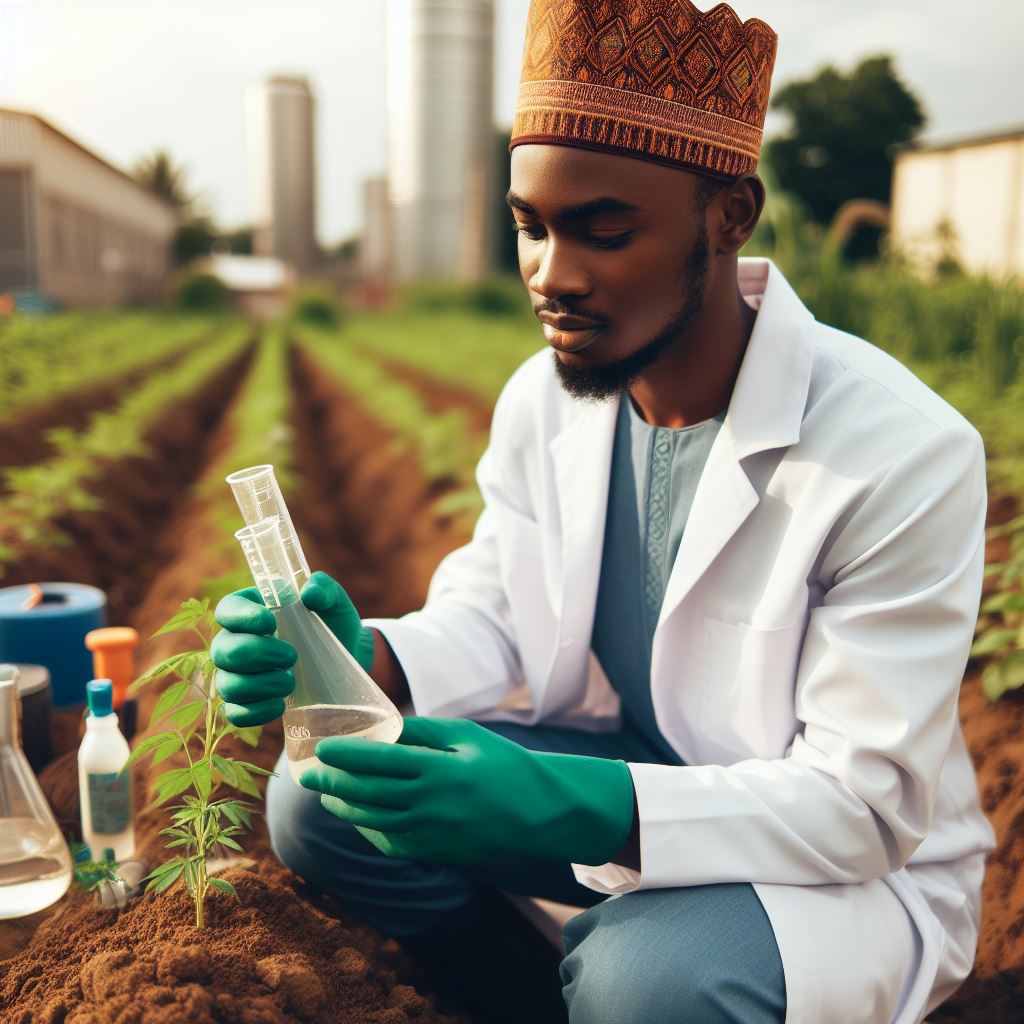Introduction
Soil science in Nigeria focuses on studying the composition, properties, and management of soils in the country.
Fieldwork plays a crucial role in Nigerian soil science by providing hands-on experience and practical understanding of soil processes.
Importance of fieldwork in Nigerian soil science
Fieldwork allows soil scientists to observe soil properties, collect samples, and collect data directly from the field.
It helps in understanding the local soil conditions, identifying soil types, and assessing soil fertility.
Fieldwork provides valuable insights into soil management practices and helps in developing effective agricultural strategies.
Purpose of the blog post
This blog post aims to showcase the significance of fieldwork in Nigerian soil science.
It will highlight the practical aspects of soil science, the benefits of hands-on experience, and the contribution of fieldwork in advancing research and agricultural practices in Nigeria.
The post will discuss the opportunities and challenges faced by soil scientists during fieldwork and the impact it creates in the field of soil science.
By engaging in fieldwork, soil scientists gain a comprehensive understanding of soil characteristics, nutrient cycles, and soil conservation practices.
It allows them to bridge the gap between theoretical knowledge and practical application.
Through this blog post, readers will gain an insight into the exciting world of Nigerian soil science and appreciate the importance of fieldwork in advancing agricultural productivity and sustainability.
Overview of Nigerian Soil Science
Definition and Scope of Soil Science in Nigeria
Soil science in Nigeria is the study of the composition, formation, classification, and management of soils within the country.
It encompasses the various aspects of soil properties and their interactions with plants, animals, and the environment.
Role of Nigerian Soil Scientists in Agriculture and Land Management
Nigerian soil scientists play a crucial role in agriculture and land management by providing insights into soil fertility, nutrient management, and sustainable farming practices.
They assist farmers in optimizing crop growth and improving soil health through effective land management techniques.
Key Challenges and Opportunities in Nigerian Soil Science
One of the main challenges in Nigerian soil science is the degradation of soil quality due to erosion, deforestation, and improper land use practices.
Another challenge is the lack of awareness among farmers about the importance of soil testing and proper soil management techniques.
These challenges also present opportunities for Nigerian soil scientists to create awareness, develop innovative solutions, and promote sustainable soil management practices.
Significance of Fieldwork in Gathering Data and Conducting Research
Fieldwork is of utmost importance in Nigerian soil science as it provides practical experience and allows scientists to collect accurate data directly from the soil.
Fieldwork enables scientists to observe soil characteristics, measure soil properties, and conduct experiments in real-world conditions.
Read: Comparing Agricultural Policies: Nigeria & Beyond
Importance of Field Work in Nigerian Soil Science
Hands-on experience in data collection and analysis
In Nigerian soil science, field work plays a crucial role in data collection and analysis.
Field work provides researchers with hands-on experience, allowing them to gather firsthand data.
Real-life application of theoretical knowledge
This practical experience enhances their understanding of theoretical knowledge and its real-life applications.
Studying the characteristics of Nigerian soil in its natural environment is an invaluable opportunity.
Being able to observe the soil in its natural habitat helps scientists better understand its properties.
Opportunity to study Nigerian soil characteristics in their natural environment
Field work also allows researchers to study soil fertility and management practices in a practical setting.
By engaging in field work, scientists can witness the impact of various management techniques on soil health.
Field observations provide valuable insight for research and policy decisions in Nigerian soil science.
Researchers can incorporate their observations into their studies to further validate their findings.
Field work also helps policymakers make evidence-based decisions regarding soil management and conservation.
The inclusion of field work in research and policy decisions ensures that recommendations are practical and effective.
Field work facilitates collaboration between scientists, farmers, and other stakeholders in Nigerian soil science.
Farmers can provide valuable insights based on their experiences and observations in the field.
Researchers can also share their findings and recommendations directly with farmers, fostering knowledge exchange.
Enhanced understanding of soil fertility and management practices
Field work allows scientists to identify and address challenges related to soil fertility and management.
Identifying these challenges helps researchers develop innovative solutions to improve soil health.
Field work in Nigerian soil science also plays a critical role in education and capacity building.
Students and young researchers can gain practical skills and knowledge through hands-on field work experiences.
Field work fosters a deeper connection between researchers and the natural environment.
Transform Your Career with Expert Guidance
Get personalized mentorship consulting that’s tailored to your unique path. Our expert advice is actionable and exclusive.
Get StartedBeing directly engaged in the field allows researchers to develop a personal understanding and appreciation of Nigerian soil.
The importance of field work in Nigerian soil science cannot be overstated.
Without field work, research in soil science would be limited to laboratory experiments and theoretical models.
Field work brings soil science to life by grounding it in the context of Nigerian landscapes and agricultural practices.
Overall, field work provides invaluable hands-on experience, real-life applications, and deeper insights into Nigerian soil science.
It enhances understanding, informs research and policy decisions, and contributes to sustainable soil management practices.
Read: Postgraduate Opportunities in Crop & Soil Science
Field Techniques and Equipment Used in Nigerian Soil Science
Sampling methods for soil analysis
Sampling is a crucial step in soil analysis as it determines the quality of data collected.
Soil samples are collected using methods such as random sampling, grid sampling, and transect sampling.
The objective is to collect representative samples that reflect the overall characteristics of the soil.
Techniques for measuring soil properties
Soil texture can be determined by hand using a simple method called the “feel method.”
Another technique involves using instruments such as the hydrometer or laser diffraction for accurate measurement.
PH levels can be measured using pH meters or indicators. Organic matter content can be determined through loss on ignition.
Use of advanced instruments and equipment
Spectrometers are used to analyze soil samples for nutrients and minerals without the need for chemical extraction.
Penetrometers are used to measure soil compaction, providing insights into root growth and soil health.
Other instruments like ion-selective electrodes, spectrophotometers, and gravimetric equipment are also used.
Role of geospatial technology in fieldwork
Geospatial technology, particularly GIS (Geographic Information System), helps in mapping and analyzing soil properties.
Remote sensing, through the use of satellites and aerial imagery, provides valuable information about soil characteristics.
These technologies enable scientists to identify soil variability and make informed decisions about land use and management.
Field techniques and equipment play a vital role in Nigerian soil science.
Sampling methods ensure representative data collection, while measuring techniques provide accurate soil property analysis.
The use of advanced instruments and geospatial technology enhances the efficiency and effectiveness of fieldwork.
These practices contribute to a better understanding of Nigerian soils, leading to informed decisions in agriculture and land management.
Read: The Interplay Between Soil Health & Crop Protection in Nigeria

Uncover the Details: Comparative Study of Pasture Management in Nigeria vs. Abroad
Examples of Field Work in Nigerian Soil Science
Case studies of research projects conducted in various regions of Nigeria
One research project focused on studying the effect of fertilizer application on crop yield in northern Nigeria.
Another project examined the impact of land use changes on soil quality in the Niger Delta region.
A case study investigated the presence and impact of heavy metal contamination in urban soils of Lagos.
Description of field experiments and trials
Field experiments were conducted to determine the optimal irrigation schedule for tomato cultivation in the southwestern region.
Trials were carried out to evaluate the effectiveness of different soil amendments in reducing soil erosion in the eastern part of the country.
In-situ trials were conducted to assess the impact of different organic fertilizers on soil fertility in the central region.
Involvement of soil scientists in soil surveys and mapping
Soil scientists actively participated in nationwide soil surveys to assess soil properties and classify soil types.
They collected soil samples from various locations and analyzed them in the laboratory to create soil maps.
These maps provide valuable information for land use planning, agricultural practices, and environmental management.
Collaboration with other disciplines (agronomy, hydrology, ecology, etc.) in fieldwork
Soil scientists collaborated with agronomists to study the interaction of soil properties with crop growth and nutrition.
They partnered with hydrologists to investigate the impact of soil characteristics on water infiltration and runoff.
Collaboration with ecologists helped understand the influence of soil conditions on biodiversity and ecosystem functioning.
Field work in Nigerian soil science involves diverse research projects, experiments, soil surveys, and interdisciplinary collaborations.
These activities contribute to the advancement of knowledge and sustainable land management practices in Nigeria.
Read: Scholarships & Funding: Studying Crop Protection in Nigeria
Challenges and Opportunities in Field Work
Difficulties faced by soil scientists in the field
- Soil scientists often face challenges related to accessibility when conducting field work.
- The terrain can be rugged and remote, making it difficult to reach certain sites.
- Weather conditions also play a significant role in hindering field work.
- Heavy rain or extreme heat can make it challenging to collect soil samples or set up equipment.
- Insects and other wildlife can pose additional difficulties during field work.
Importance of proper planning and logistics for successful fieldwork
- For successful field work, proper planning and logistics are of utmost importance.
- Planning involves identifying research objectives and determining the specific locations to visit.
- Logistics include arranging transportation, acquiring necessary permits, and organizing equipment and supplies.
- With careful planning, soil scientists can optimize their time in the field and achieve more accurate results.
- Adequate logistical support ensures that all resources are available when needed, minimizing delays.
Role of teamwork and collaboration in overcoming challenges
- Teamwork and collaboration play a crucial role in overcoming challenges faced during field work.
- By working together, soil scientists can share knowledge and skills, enhancing the efficiency of their work.
- Collaboration also enables the division of tasks, allowing for better utilization of resources.
- Furthermore, team members can provide support and assistance to one another, increasing productivity.
- In challenging situations, collaboration fosters innovative problem-solving and enhances overall outcomes.
Opportunities for innovation and technological advancements in fieldwork
- Field work in soil science presents numerous opportunities for innovation and technological advancements.
- Advancements in remote sensing technology allow for more efficient data collection and analysis.
- Tools like GPS devices and drones enable soil scientists to gather precise spatial information.
- The use of mobile applications and cloud-based platforms enhance data management and sharing.
- These technological advancements improve the accuracy, speed, and overall effectiveness of field work in soil science.
Uncover the Details: Nigerian Universities Leading in Animal Health Tech
Conclusion
Fieldwork plays a crucial role in Nigerian soil science, enabling researchers to gather firsthand data and observations.
Aspiring soil scientists should actively seek opportunities for fieldwork to develop essential practical skills and expand their knowledge base.
Fieldwork in Nigerian soil science has significantly contributed to the understanding of soil properties, nutrient management, and sustainable agricultural practices.
The future of fieldwork in Nigerian soil science looks promising, with advancements in technology and greater collaboration between researchers and farmers.
However, the value of hands-on experience and fieldwork should never be underestimated.
Fieldwork is an integral part of Nigerian soil science, providing invaluable insights and practical expertise.
Aspiring soil scientists must actively engage in hands-on experiences to further their understanding and contribute to the advancement of this important field.
The significance of fieldwork cannot be overstated in Nigeria’s soil science journey, and its continued emphasis is crucial for sustainable agricultural practices and food security in the country.




